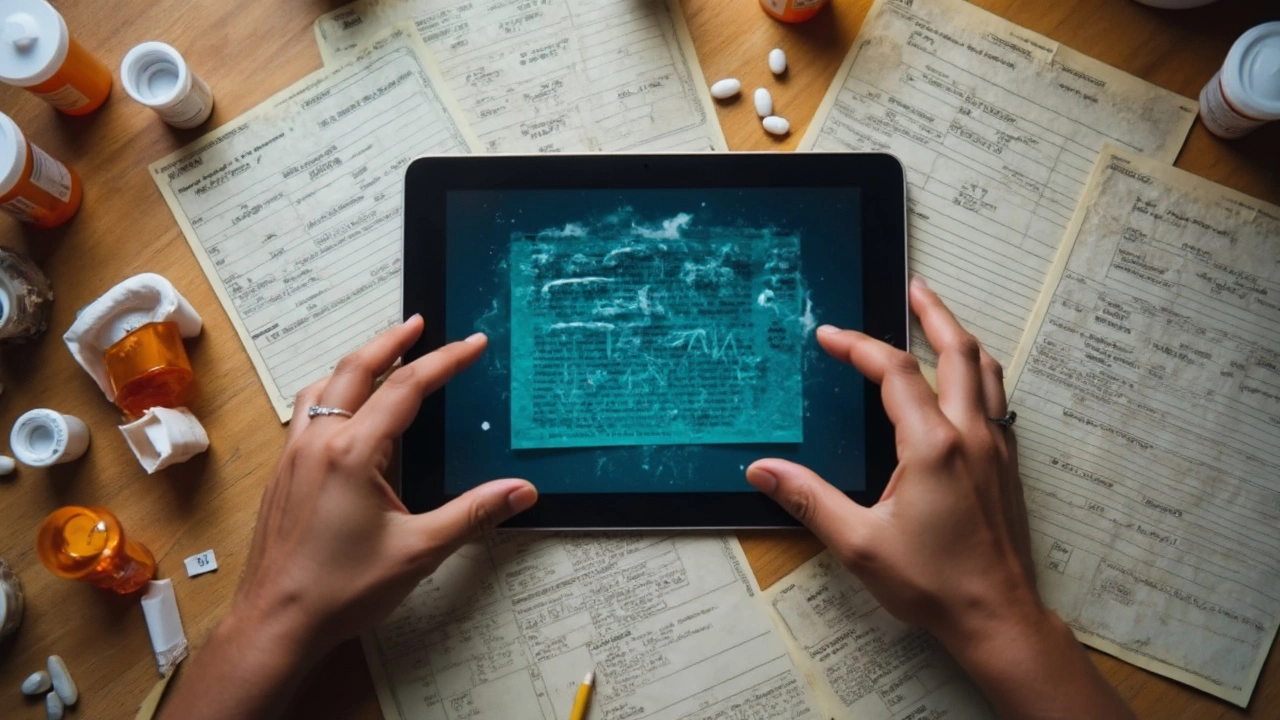You wouldn’t grab pills from a random box at a bus stop, right? Still, that's the kind of risk you might take if you don’t check out online pharmacies properly. Most people shop for meds online to save some cash or dodge the hassle of doctor visits. But convenience can quickly turn into danger if you aren’t careful.
Fake medicines are a huge problem online. One little-known fact: the World Health Organization estimates that one in ten medical products in low- and middle-income countries is fake or substandard. And the web makes it way easier for those bad pills to spread everywhere—even to countries like ours.
Scammers set up legit-looking websites, slap a “pharmacy” label on them, and promise miracle cures or cheap prices. If you’re not paying attention, you could end up with pills that do nothing—or worse, that actually harm you. You don’t just risk wasting money. You risk your health.
There’s more to it. A lot of dodgy sites will happily take your medical info or credit card details and sell them on. And if they ignore prescription requirements, you might end up with meds that clash with what you’re already taking—or stuff that really needs a proper doctor’s supervision.
- Fake Medicines: How Common Are They Online?
- Data Privacy and Personal Security Risks
- Prescription Shortcuts: What’s the Harm?
- Shipping, Storage, and Quality Issues
- How to Spot a Safe Online Pharmacy
Fake Medicines: How Common Are They Online?
Here’s a scary fact: fake meds are absolutely everywhere online. According to the World Health Organization, around 50% of medicines sold on the internet from illegal sites are either fake or contain the wrong ingredients. That means for every two websites that look legit, at least one could be putting something totally useless—or dangerous—into your package.
Counterfeit drugs aren’t just a problem on shady corners of the web. Even sites that look professional and offer popular meds can be traps. Ever seen those ads for cheap "Viagra" or "antibiotics without a prescription"? There's a good chance they’re pushing fakes. Some pills have no active ingredient, while others might have way too much, or even something totally different like chalk or paint.
The dangers aren’t just about wasting money. If you end up with a fake antibiotic, you might think you’re treating an infection, but really, the germs just get stronger. Or with fake heart meds, missing the right dose could put your life at risk. It’s not just a few unlucky people either—studies suggest at least one in ten medicines in low-income countries are fake, and global online sales keep rising.
So, why are online pharmacy sites such a hotspot for this stuff? For one, it’s tough to track web stores. Scammers just change their website name every time they get blocked, and it’s nearly impossible for regular people to keep up. Even when police shut down thousands of sites (this actually happened in 2023 in a global operation), a wave of new ones pops up just as fast.
If you’re shopping for medicine online, here’s what to watch for:
- Super low prices that look too good to be true.
- Sites selling prescription-only meds without asking for a prescription.
- Weird website addresses or spelling mistakes everywhere.
- No clear contact info or customer service you can actually reach.
- Fake "certifications" or logos that don’t match official pharmacy boards.
Sticking to licensed, well-known sites is way safer than taking a gamble on a mystery online store just for a cheap deal. When it comes to medicine, a low price isn’t worth risking your health.
Data Privacy and Personal Security Risks
Buying meds online means handing over a pile of personal details, like your address, medical history, and credit card number. But not every online drugstore keeps this info safe. Hackers love targeting these sites, and data breaches are way more common than most folks think. In 2023 alone, there were dozens of public reports about online pharmacy data leaks, exposing names, health info, and payment details. That’s not just an open door to junk mail but also to identity theft and even insurance scams.
Some shady online pharmacies don’t even try to protect you. They might sell your details to advertisers, scammers, or worse, dark web data brokers. Remember the US pharmacy chain that made headlines in 2022 after a hack? Thousands of customers got hit with phishing calls pretending to be from their pharmacy. All it takes is your name and birthday in the wrong hands, and you’re stuck dealing with calls, emails, and sometimes fake bills or stolen credit card charges for months.
Here’s what to look out for to protect yourself when using an online pharmacy:
- Check for HTTPS in the website address, not just "HTTP" – the S means secure.
- Read the privacy policy. Reputable pharmacies explain exactly how they use and store your data.
- Don’t trust sites that ask for way too much info or ship meds without a prescription—real pharmacies always confirm your identity and request a valid prescription for prescription drugs.
- Watch for reviews and verifications, like the National Association of Boards of Pharmacy (NABP) or LegitScript badges.
Always double-check who’s getting your info before clicking buy. If a site seems cheap but doesn’t care about security, it’s just not worth it.

Prescription Shortcuts: What’s the Harm?
A lot of online pharmacies skip the whole prescription process, or they basically rubber-stamp any request. It might feel like a fast lane to get what you need, but let’s be real—it can mess with your health fast.
Here’s the thing: prescriptions aren’t just red tape. Doctors ask about your other meds, your health, even family stuff, because mixing the wrong drugs can have nasty effects. For example, some blood pressure pills can seriously clash with the stuff used for migraines, or even with common antibiotics. If a pharmacy skips these checks, nobody’s watching out for you.
Not all shortcuts are obvious. Some sites make you fill out a quick survey with yes/no questions and call it a ‘consultation.’ Without proper follow-up, that’s not really a doctor’s advice. Sites that let you order antibiotics, painkillers, or sedatives without any real checks are red flags.
Why does it matter? Check out this table showing risks from online pharmacies that skip prescriptions, according to a recent report from the National Association of Boards of Pharmacy (NABP):
| Issue | Potential Harm | Estimated Frequency |
|---|---|---|
| No real consultation | Misdiagnosis, wrong meds | 25% of shady sites studied |
| No check for drug interactions | Serious side effects, allergic reactions | Nearly 40% risk increase |
| No dosage review | Overdose or underdose | Reported in 30% of cases |
Most countries, including India and the US, make it illegal for online pharmacies to sell prescription drugs without the real deal from a registered doctor. If a site lets you skip this step, it’s ignoring the law and your safety.
Want a quick gut-check? Here’s an easy tip: if an online pharmacy doesn’t ask for an actual prescription from your doctor, don’t trust it. Real online pharmacies want the paperwork. That’s not them being annoying—that's them following the rules and protecting you.
When in doubt, stick with websites clearly linked to trusted hospital chains or licensed physical pharmacies. For anything prescription-only, treat shortcuts as a big warning sign. Speed isn’t worth gambling your health.
Shipping, Storage, and Quality Issues
Shipping meds sounds easy, but actually, it's where things can really go wrong with online pharmacies. The moment your medication leaves the seller, you’ve got no clue what’s happening behind the scenes. Did you know that most medicines—especially things like insulin or antibiotics—need to stay below a certain temperature and away from moisture? Stick them in a hot delivery van in the middle of summer, and you can forget about them working right.
Check out this table for some basics on common meds:
| Medication Type | Ideal Storage Temp | Possible Damage if Mishandled |
|---|---|---|
| Insulin | 2-8°C (refrigerated) | Becomes useless if too hot |
| Antibiotics (liquid) | 2-8°C | Breaks down, loses potency |
| Birth control pills | Below 25°C | Less effective if too warm |
Another issue: the journey your package takes. International parcels can get held up in customs for weeks or even months, especially if they look suspicious. That delay isn’t just annoying. Medicines can expire during shipping, or packaging seals can break, letting germs or air inside.
Worried about online pharmacy orders arriving damaged or different than you expected? You’re not alone. In a 2023 US FDA report, nearly 20% of medicines ordered online showed up in compromised packaging, missing the original safety seals, or with unclear labels. That’s a big deal, because even legit pills are risky if handled wrong.
If you absolutely have to order online, look for sellers who are transparent about how they pack and ship medication. The best online pharmacies use special containers and tracking, and they make it clear how they keep temperature-sensitive meds cool and dry during delivery. Always double-check the packaging and labels when your order arrives. If something looks off, don’t risk taking it—contact the seller or your doctor first.
- Ask the pharmacy if they use insulated or cold-chain shipping for sensitive meds.
- Only use sites with clear contact info and customer service you can reach by phone.
- If a shipment is delayed, check the expiration dates and condition before using anything.
- Never accept damaged, unsealed, or unlabeled medication.

How to Spot a Safe Online Pharmacy
Shopping for medicine online isn’t risky if you know how to spot a legit pharmacy. Some signs are obvious, but a few are sneaky. Let’s break down what to look for so you don’t get fooled and stay healthy.
The golden rule: only buy from pharmacies that require a valid prescription. If a site lets you order anything—no questions asked—it’s a huge red flag. Real pharmacies follow the law and want to make sure you’re getting the right treatment. In the US, for example, all legit online pharmacies should be licensed with the state board of pharmacy and should display their license number clearly.
Want a quick cheat sheet? Here’s what you need to check before you click “buy” on any online pharmacy:
- Look for the pharmacy’s license. Check if it’s listed with your country’s health authority—like the U.S. National Association of Boards of Pharmacy (NABP) or India’s Central Drugs Standard Control Organization.
- Check for the NABP’s "VIPPS" seal or similar certifications. These seals mean the pharmacy has passed strict safety checks.
- Make sure the site asks for a doctor’s prescription before filling the order.
- Read reviews on third-party sites, but be cautious of fake reviews—they do pop up.
- Avoid pharmacies that offer prices way lower than everyone else, especially for brand-name drugs. If a price seems too good to be true, it probably is.
- Look for real contact info: a physical address and a way to reach a pharmacist in case you have questions.
- See if the site uses secure payment (look for HTTPS in the address bar).
Here’s a quick table comparing key checks for safe and unsafe pharmacies:
| Feature | Safe Online Pharmacy | Unsafe Online Pharmacy |
|---|---|---|
| Prescription Required | Yes | No |
| License Displayed | Yes (with regulatory body) | No or fake numbers |
| Official Certifications (e.g., VIPPS) | Yes | No |
| Price Range | Within standard | Suspiciously cheap |
| Contact Info | Real address and phone | None, fake, or only email |
Out of all the tips, the online pharmacy you choose should always feel transparent and willing to answer your questions. If something feels off, don’t take chances with your health. Only stick to pharmacies that tick all the boxes above.





